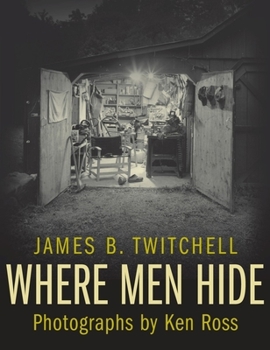Where Men Hide
Select Format
Select Condition 
Book Overview
"If you ask men if they spend any time hiding, they usually look at you as if you're nuts. 'What, me hide?' But if you ask women whether men hide, they immediately know what you mean."--from Where Men Hide Where Men Hide is a spirited tour of the dark and often dirty places men go to find comfort, camaraderie, relaxation, and escape. Ken Ross's striking photographs and James Twitchell's lively analysis trace the evolution of these virtual caves, and question why they are rapidly disappearing. Ross documents both traditional and contemporary male haunts, such as bars, barbershops, lodges, pool halls, strip clubs, garages, deer camps, megachurches, the basement Barcalounger, and Twitchell examines their provenance, purpose, and appeal. He finds that for centuries men have met with each other in underground lairs and clubhouses to conduct business or, in the case of strip clubs and the modern rec room, to bond and indulge in shady entertainments. In these secret dens, certain rules are abandoned while others are obeyed. However, Twitchell sees this less as exclusionary behavior and more as the result of social anxiety: when women want to get together, they just do it; when men get together, it's a production. Drawing on literary, historical, and pop cultural sources, Twitchell connects the places men hide with figures like Hemingway and Huck Finn, Frederick Jackson Turner's theory of the American frontier, and the mythological interpretations of Joseph Campbell and Robert Bly. Instead of blaming the disappearance of the man-cave solely on feminism, simple fair play, or the demands of Title IX, Twitchell believes this evaporation is due as well to the rise of solitary pursuits such as driving, watching television, and playing videogames. By blending together anecdote, research, and keen observation, Ross and Twitchell bring this little-discussed and controversial phenomenon to light.
Format:Hardcover
Language:English
ISBN:0231137346
ISBN13:9780231137348
Release Date:March 2006
Publisher:Columbia University Press
Length:264 Pages
Weight:1.50 lbs.
Dimensions:0.9" x 7.3" x 9.3"
Grade Range:Postsecondary and higher
Customer Reviews
3 ratings
Very enjoyable
Published by Thriftbooks.com User , 15 years ago
I really enjoyed reading the book - sometimes I reread parts of it. Great book!
Any library strong in sociology at the college level will find this an important acquisition.
Published by Thriftbooks.com User , 16 years ago
Ken Ross' black and white photos pepper an excellent survey of male habitats and their diminishing appearance and qualities, considering the history of 'virtual caves' men have gone to escape, bond, or conduct business. Major historical and literary figures and their escape routes are considered in a survey of mythical and historical places which considers the past and present of male haunts and retreats. Any library strong in sociology at the college level will find this an important acquisition.
I can't believe there are no reviews of this book yet...
Published by Thriftbooks.com User , 18 years ago
James Twitchell is a professor of English, and his love of the language definitely shows in "Where Men Hide." His prose is smooth and entertaining, and he seems to take great pleasure in revealing fascinating, little-known etymologies for words which are often quite relevant to whatever he is discussing. He also tells plenty of amusing or interesting anecdotes related to manhood, which are really what make "Where Men Hide" such enjoyable light reading. However, as Twitchell intended this book as "an architectural folly" - another fun etymological tangent, meaning he basically just intended the book to be amusing - many of the observations he makes about how manhood has changed over the past 100 years or so are not only insightful, but, in my opinion, often right on target. While his final conclusions about manhood are perhaps drearier, and more feminist friendly, than mine might be, his notes along the way are priceless. I could really go on and on about observations Twitchell made on each space - his chapters on deer camps, barber shops and workshops were among my other favorites - but instead I'll just recommend the book and try not to give away all of its secrets. "Where Men Hide" is a great book to simply have around - it even has pictures - and it's really a great light, easy read for any man. A lot of texts on masculinity are either anti-male or rather pretentious or preachy, and this is none of the above. It was just fun to read and insightful without over-reaching. I'd love to see more books like this out there!






